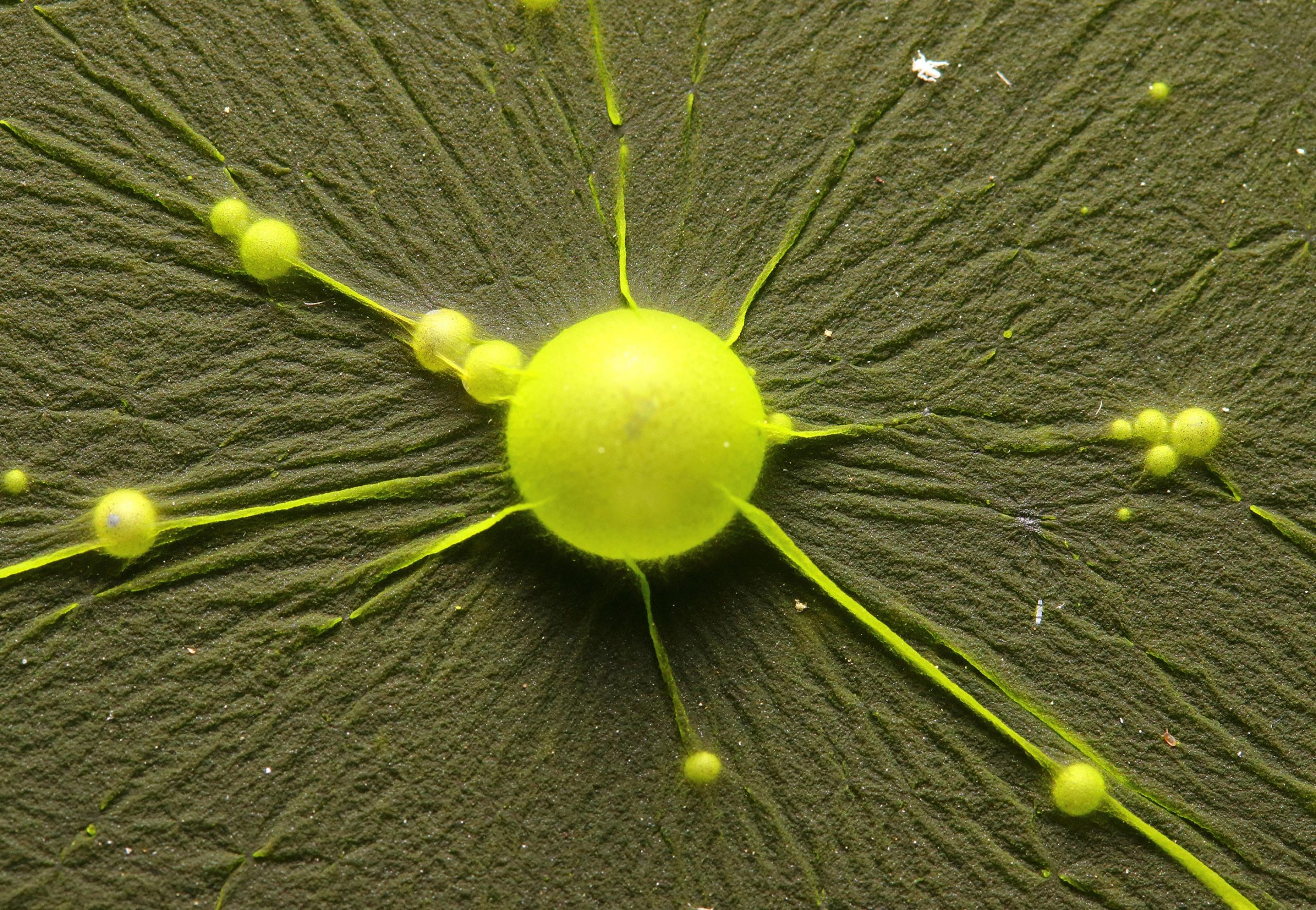
In a surprising turn of events, a team of scientists exploring the volcanic coast of Italy stumbled upon a new cyanobacteria strain they nicknamed Chonkus.
Discovered near the island of Vulcano, Chonkus has unique traits that make it a promising candidate for carbon capture — it grows rapidly when exposed to CO₂ and sinks to the ocean floor naturally.
The researchers, including team members from the Wyss Institute at Harvard University and Align to Innovate, believe that Chonkus could change the way we approach carbon sequestration. As Dr. Max Schubert noted, "It's basically built for industrial-scale decarbonization right out of the box."

The white spots in this microscope image of the "Chonkus" cyanobacteria likely represent carbon-dense granules produced by the algae, which may explain its rapid growth in carbon-rich environments and its tendency to sink quickly.
Uncovering "Fat" Algae for Carbon Capture
The discovery was made by a coalition of scientists led by Max Schubert, Ph.D., a former researcher at the Wyss Institute, now with Align to Innovate.
Driven by a hunch that some organisms thrive in carbon-rich environments, Schubert organized an expedition to Vulcano, where underwater volcanic vents provide natural carbon emissions.
His colleague, Braden Tierney, Ph.D., joined him to lead the expedition, securing funding from SeedLabs and enlisting support from several international research institutions.
In these carbon-loaded waters, the team found Chonkus, an algae with an unusual trait: it sinks. Unlike most algae, which float freely, Chonkus has a dense structure, causing it to fall to the ocean floor.
This unique trait could be a game-changer for scientists looking for ways to capture and store carbon. Schubert described its texture as "green peanut butter," highlighting its potential for use in biomanufacturing processes.
>> In Other News: Vortex Energy’s Collaboration with the University of Alberta Receives MITACS/NSERC Funding of $1.08 Million
Scaling Up Chonkus for Carbon Capture
Back in the lab, Schubert and Tierney replicated Chonkus's ideal conditions, cultivating it in a warm environment with ample light and a high CO₂ concentration.
The team identified two strains, with UTEX 3222 standing out. This strain, affectionately nicknamed “The Chonk,” grows into densely packed colonies, making it highly efficient for lab cultivation.
Chonkus is more than just a large algae; it carries an increased carbon content, thanks to the large granules it stores in its cells. Additionally, its natural ability to sink makes it easier to harvest and concentrate, a major advantage in algae production.
This feature could help reduce production costs by up to 30%, as it minimizes the need for drying and processing. Tierney remarked that "Many of the traits we observed in Chonkus aren't inherently useful in their natural environment, but they're very useful to humans."

A New Algae Solution for the Future
The potential applications for Chonkus are vast. In addition to carbon sequestration, the algae could support sustainable production of omega-3 fatty acids, antioxidants, and algae-based supplements.
Its high-density growth and carbon-capture abilities make it ideal for biomanufacturing, potentially transforming the carbon capture industry.
Schubert and Tierney are optimistic about Chonkus’s future. To encourage further research, they made samples of UTEX 3222 available through the University of Texas’s Culture Collection of Algae, allowing scientists worldwide to study its unique properties.
Additionally, Tierney co-founded The Two Frontiers Project, a non-profit organization dedicated to discovering microbial species with beneficial traits for carbon capture and other ecological applications.
Responsible Deployment of "Superbugs"
The promising capabilities of Chonkus come with a call for caution. Renowned Harvard and MIT professor George Church, a co-author of the study, emphasized the need for responsible handling of such potent biological tools.
He noted, "The traits inherent in naturally evolved strains like Chonkus can be game-changing, but it's critical to ‘build the seatbelts before you build the car.’"
Church’s team is actively working on containment strategies to ensure that Chonkus stays within controlled environments, preventing unintended ecological impacts.
With its natural ability to store carbon and ease of cultivation, Chonkus could soon play a central role in environmental efforts to mitigate carbon emissions.
For scientists, policymakers, and environmental advocates alike, this algae represents a new avenue for carbon capture — and perhaps a turning point in the fight against climate change.
Subscribe to the newsletter
Daily decarbonization data and news delivered to your inbox
Follow the money flow of climate, technology, and energy investments to uncover new opportunities and jobs.
Latest issues
-
This $4.1M Deal Could Change Carbon Capture's Playbook
Inside This Issue 🗜️ CarbonQuest Lands $4.1M Alberta Deal on Gas Compressors 🛡️ CADO, 123Carbon, and Assure SAF Registry Join Forces to Tackle SAF Integrity Gaps ✈️ ISCC, OMV, and Airbus Partner t...
-
Can Koloma Crack Iowa's Billion-Year-Old Secret?
Inside This Issue ⛏️ Iowa's Hydrogen Rush: Can Koloma Strike Gold Before Rules Kick In? ✈️ Bentley Commits to Use 100% Sustainable Aviation Fuel for Car Airfreight 🌬️ Minister Parrott Provides Upd...
-
$47M Just Poured Into This SAF Producer
Inside This Issue 💰 LanzaJet Announces $47M in New Capital and First Close of Equity Round at $650M Pre-Money Valuation 🚢 Maersk's Ethanol Bet Could Reshape U.S. Fuel Markets 🪨 Canada Nickel and t...
Company Announcements
-
Feedstocks are Perennial Grasses and other Renewable Biomass Sources FREDERICK, Md., Feb. 18, 2026 /PRNewswire/ -- Do you know why passenger and freight planes are not using renewable biofuel? It'...
-
Vancouver, British Columbia--(Newsfile Corp. - February 25, 2026) - Q Precious & Battery Metals Corp. (CSE: QMET) (OTC Pink: BTKRF) (FSE: 0NB) ("QMET" or the "Company") congratulates Quebec Inn...
-
Carbon Direct and C2X Announce Collaboration on Pioneering Forestry Residue-to-Biofuel Project
Collaboration on C2X’s Beaver Lake Biofuels project advances biomass carbon removal and storage as a scalable climate solution, transforming Louisiana’s forestry and sawmill residues into biofuel a...
-
Carbon Direct and C2X Announce Collaboration on Pioneering Forestry Residue-to-Biofuel Project
Collaboration on C2X’s Beaver Lake Biofuels project advances biomass carbon removal and storage as a scalable climate solution, transforming Louisiana’s forestry and sawmill residues into biofuel a...